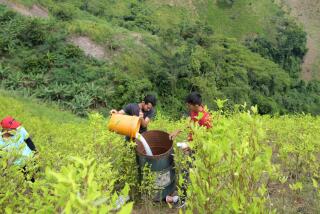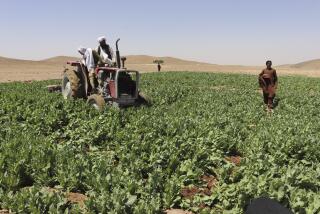Gun-Toting Poppy Farmers Face Anti-Drug Warriors : Pakistan: Tribesmen vow to fight to the finish if the nation’s ‘Holy War Against Narcotics’ reaches into their far mountains.
- Share via
NIHAG PASS, Pakistan — Pathan tribesmen harvesting opium poppies in Pakistan’s rugged mountains bordering Afghanistan tend their fields with assault rifles and machine pistols slung over their backs.
They say they will fight to the finish if Pakistan brings its declared “Holy War Against Narcotics” for 1993 to the remote land where their ancestors have grown poppies for generations.
“We have heard that they plan to destroy our next crop. We will fight to the last child if they do,” said Malick Sardaraz, a white-bearded tribal elder in his 70s.
Western officials say the Pathans traditionally produced opium for home use, not as the cash crop they now sell to heroin manufacturers.
Sardaraz, from the Penda Khel clan, cultivates his poppies on narrow, terraced fields carved into the sides of the valley leading to Nihag Pass in the Dir district of North West Frontier Province.
“This is an impoverished place. There is no other way of getting money,” he said, surrounded by heavily armed fellow elders in the courtyard of a hillside fortress.
Tribesmen in two more valleys in Dir are defying the government as Pakistan comes under increasing pressure from the United States and other Western nations to stem the flow of heroin that the poppies fuel.
Pakistan is the world’s biggest heroin producer after the Golden Triangle of Burma, Thailand and Laos.
Output could rise as more poppy flows in for processing from Afghanistan, where land under cultivation has risen by between 20% and 30% since the end in April, 1992, of the 14-year guerrilla war against the former communist-backed government.
This month, 10 days after the flowers have shed their petals, Pakistan’s poppy farmers begin milking the waist-high plants--slitting the green, bulbous heads and collecting the brown opium glue that seeps out.
Sardaraz said he sells his sticky opium bricks for $43 per pound to “the men who roam in Pajeros”--shadowy buyers who arrive in the valley in the Japanese Mitsubishi Pajero jeeps that have become the Pakistani symbol of wealth.
The opium is refined into heroin in factories hidden along the Pakistan-Afghan border, in a simple process involving the chemical additive acetic anhydride.
“We know heroin is evil but we produce only opium, which has a beneficial medical use,” said Sardaraz. “Besides, the Americans produce guns and liquor--everybody has his own means of making money.”
Sardaraz and his clansmen say they might stop growing poppy if the government provides free education, electricity and irrigation, as well as employment and a viable alternative crop.
Pakistan and the U.N. Drug Control Program have been trying since 1985 to improve the economy and farming system of Dir so that its people can be weaned from poppy-growing.
The scheme has had limited success.
Manzoor Ahmad, provincial deputy secretary for interior affairs, said the total area under poppy in the province had been cut from 18,000 acres in 1992 to about 14,000 acres this year.
The UNDCP is watching the harvest closely before it decides whether to fund a second, four-year phase of the Dir project on which it has already spent $20 million.
“The jury is still out,” said Ralph Seccombe, the UNDCP’s Pakistan field adviser.
“The UNDCP has frankly and formally stated its concern and has said it expects that a substantial decrease should be the basis for a second phase,” he said.
A firm figure for total heroin production is hard to come by.
Some Western officials work on what they admit is a national estimate of 100 tons a year. Turkish gunboats aided by U.S. narcotics agents recovered 10 tons of heroin aboard a ship that sailed from southern Pakistan in January.
Deputy interior secretary Ahmad said the number of heroin factories had fallen from a reported 100 in the province’s Khyber district alone in 1991 to not more than 15 in the whole of the province this year.
He acknowledged that many factories may have shifted the few miles over the poorly guarded border into Afghanistan, where poppies are grown on an estimated 57,000 acres.
“We have convicted 18 heroin manufacturers and sentenced each to 20 years imprisonment,” Ahmad said.
Other Pakistani and Western officials say rampant corruption makes it impossible to arrest the drug barons, including some who sit in the National Assembly.
More to Read
Sign up for Essential California
The most important California stories and recommendations in your inbox every morning.
You may occasionally receive promotional content from the Los Angeles Times.













